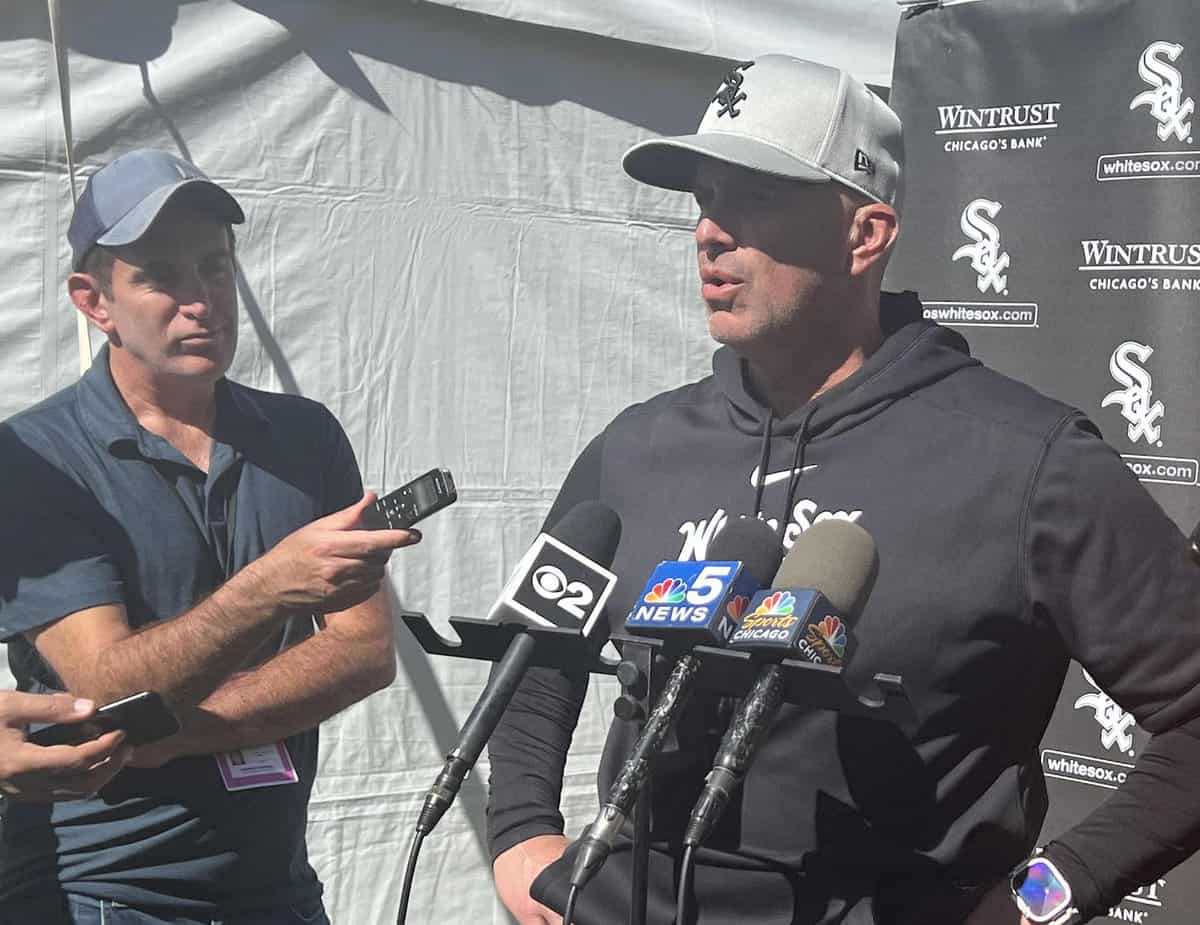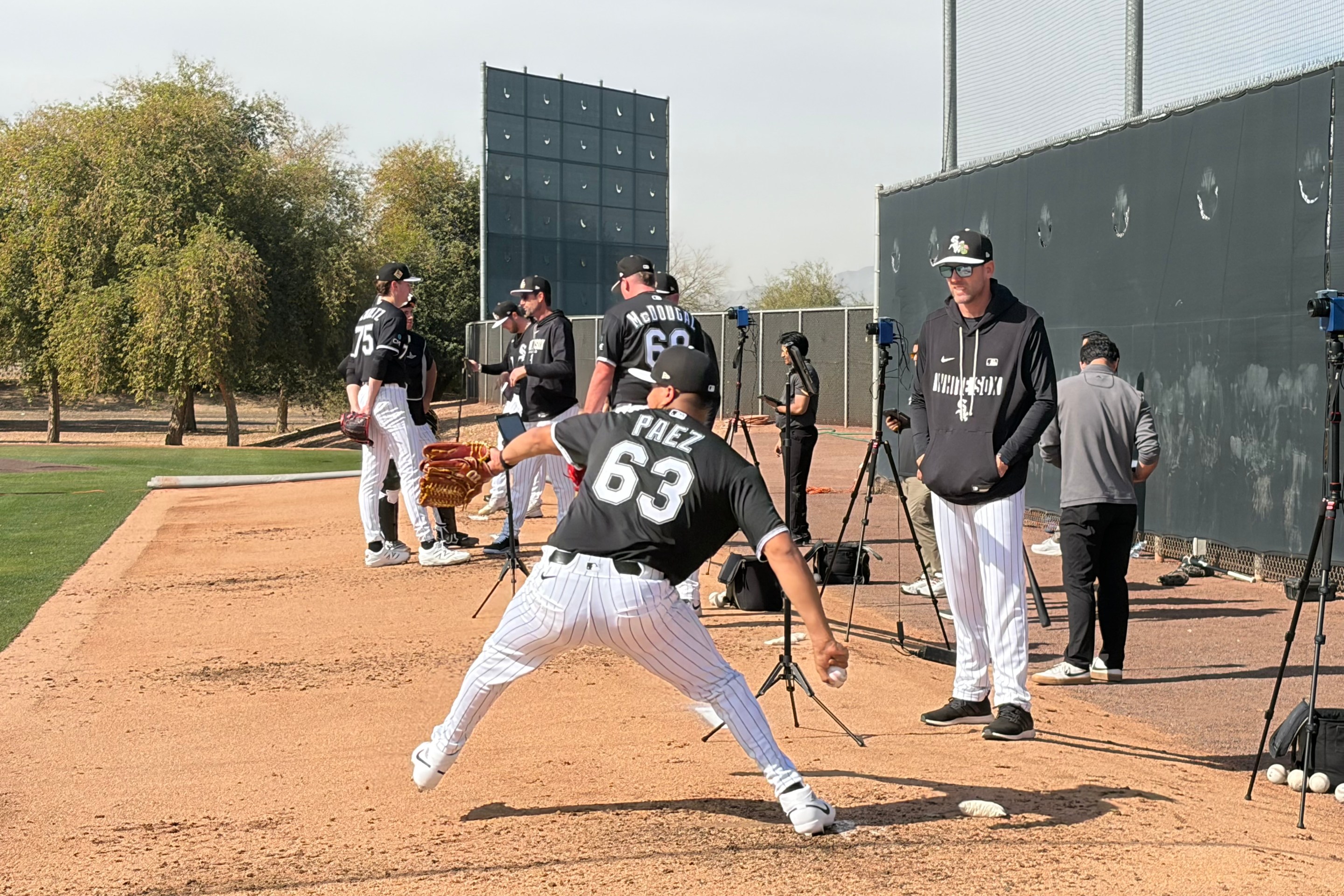PHOENIX -- Collectively, the White Sox beat has gotten him to slip a few times, but White Sox manager Pedro Grifol is adamant that he is done discussing the disastrous 2023 season.
"2023 is in my rearview mirror," Grifol said to me in a conversation in his office at Camelback Ranch. "It's a small little mirror. It sits right on top of the wheel. It's small, you look back once in a while. Then in front of you, you've got this f-cking big, big-ass windshield, where you've got all kinds of sh-t you can look at. That's where I'm at."
Grifol's stance can be appreciated. "What went wrong with the 2023 White Sox?" was already the central topic for most of the 2023 season. Relitigating who is at fault for a previous season would read as unseemly for a former manager, let alone someone trying to set the tone for a new season with a fair amount of returning players.
It is however, quite limiting. Grifol agrees that so far he's finding it easier to instill a team culture this season. Most of it he'll attribute to experience, rather than a roster dotted with former Royals who have played under him before. But his answer to whether last year's clubhouse -- full of veterans that grew quite vocal upon departure about Grifol's shortcomings in holding the team accountable and also a group that wildly underperformed under two different managers -- needed to be broken up, resembles Rick Hahn being asked at the end of 2022 what he would have done had Tony La Russa not stepped down on his own.
"I'm not going to answer that because I don't need to," Grifol said. "Our roster is different. It's really a non-factor. You deal with the roster you've got and we're happy with the roster we've got."
Grifol recognizes that communicating to the media and public is a central function of his job, but I wonder if he would prefer, were he allowed, to stop talking to media until there are results to offer. He was optimistic, energized and full of ways to address the club's ills last spring, ahead of a shortlist contender for worst season in franchise history. Nothing he can say now can make a dent in the reputation that last year's team built for him. More likely, what he says now can be used to affirm the conclusions already reached.
In that vein, I sat down ready to hear a spirited sales pitch on Grifol's FAST mantra, since a collection of placards spelling out the acronym as FEARLESS, AGGRESSIVE, SELFLESS, TECHNICALLY SOUND only sit a few feet away from us. Successful athletes can be remarkably earnest and this surely is that, and Grifol is at least not wasting time trying to gain a foothold outside of his target audience.
"Why do I have to sell you on it? I have to sell my players on it," Grifol said. "It's just playing fast. Don't you want to see that style of game?"
Grifol stipulates there are more elements of his standards for this season that he won't share publicly, but essentially, a well-played game tends to crisply hum along. Games rife with misplays, indecisiveness and miscommunication -- like the games played by Grifol's club last year -- drag out like a knife. Teams that tend to play the former type of game have defined principles to which they adhere. For teams with lengthy histories of undisciplined play, like the previous White Sox season under Grifol, hopeful acronyms can feel like bringing a tub of wet wipes to an oil slick.
Despite seemingly long odds for anything resembling traditional standards for success, Grifol is nothing if not energized. His joyful retelling of "wins" from a day of practice on the backfields pale in comparison to his color-coded charts logging the same story (he also keeps a chart for "losses"; it's merely much shorter). Grifol spent over a decade working his way up the coaching ladder, interviewed for more than his share of managerial positions, and had his first opportunity at his dream job blow up in disastrous, potentially career-defining fashion. Now he discusses his work with the vigor of someone granted another chance to prove they were built to do this.
"Part of my evaluation of whether this was something I wanted to do with my life, is knowing that it entailed a ton of pressure," Grifol said, when asked about entering a season where it's rational to assume he's managing for his job.
In a similar conversation ahead of what wound up being his final season, Rick Renteria quipped, "I worry about doing my job, not losing my job." Grifol cites his family and faith as crucial for guiding him through the horrific difficulties of last season, but also the job itself. Maybe it hits home stronger for people who have recently gone through a period of unemployment, but the enveloping nature of the managerial job always offers the comfort of the next task. The next win is always around the corner.
"That's what gets me through it," Grifol said. "If I wasn't doing anything and just sitting here on my ass and worrying about, 'Oh sh-t, we messed it up today and I hope we don't mess it up tomorrow,' that ain't gonna work."
Sticking to this mentality feels like it will particularly vital for enduring the 2024 White Sox season. Rather than set up for a return to glory, Grifol has been tasked with shepherding a club where eclipsing 70 wins would be widely read as overachieving. Whereas winning clubs enjoy the unifying force of a shared purpose, this clubhouse is almost guaranteed to navigate the conflict of prospects pushing out veteran regulars, and struggling players staring down the end of their careers. The path to Manager of the Year votes is narrow.
Asked how would he define a successful season this year outside of a playoff berth, and Grifol is reluctant to engage with it. No one will be putting "PLAYING .500 BALL WOULD BE A BIG WIN FOR US," signs going up next to the "PLAY FAST TODAY" placards around Camelback Ranch.
"At the end of the day, you're defined by what?" Grifol said. "So come on, what are we talking about here? If we do things right, and we play the right way and we continue on the path that we're on, we should have some success. But defining Major League Baseball? It's wins and losses."
I float a scenario where this year's club plays some of the best, cleanest defense in the league, propping up an unproven pitching staff, while earning a reputation as a headache to play due to their tenacious and smart baserunning, but finishes in the middle of the pack in the AL Central because last year's second-worst offense simply did not have the bats to contend. In this world, I offer that it would be hard for me to write anything other than that Grifol did the job he was asked to do, however thankless it is to helm a team in transition.
Grifol is curious enough to ask, "How did we play?" since certainly a manager preaching FAST could imagine appreciating a group of hitless wonders who gave their opponents hell for six months straight, before retreating to acceptance that meeting his own standards is not what determines his fate.
"The beauty of this thing is that it's not my evaluation," Grifol said. "Everybody's got their own and everybody is entitled to their own. That's one thing I believe in and I will never change. You're entitled to evaluate us and write whatever you feel you need to write about us. Our job is to make sure that we force you to write good stuff. That's our job. Your job is to evaluate us, whatever you feel. So if you're asking for my evaluation, I'll let you know at the end of the year."






